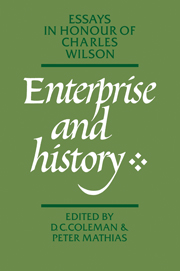Book contents
- Frontmatter
- Contents
- Preface
- List of contributors
- Part I Images and interpretations
- Part II England and the Low Countries in pre-industrial times
- 5 Bruges as a trading centre in the early modern period
- 6 English re-exports and the Dutch staplemarket in the eighteenth century
- 7 ‘Little London’: British merchants in Rotterdam during the seventeenth and eighteenth centuries
- 8 Prejudice and policy: Sir George Downing as parliamentary entrepreneur
- 9 The lawyer as businessman in eighteenth-century England
- Part III Enterprise, finance and politics in the modern world
- Bibliography of Charles Wilson's published works
- Index
6 - English re-exports and the Dutch staplemarket in the eighteenth century
Published online by Cambridge University Press: 12 March 2010
- Frontmatter
- Contents
- Preface
- List of contributors
- Part I Images and interpretations
- Part II England and the Low Countries in pre-industrial times
- 5 Bruges as a trading centre in the early modern period
- 6 English re-exports and the Dutch staplemarket in the eighteenth century
- 7 ‘Little London’: British merchants in Rotterdam during the seventeenth and eighteenth centuries
- 8 Prejudice and policy: Sir George Downing as parliamentary entrepreneur
- 9 The lawyer as businessman in eighteenth-century England
- Part III Enterprise, finance and politics in the modern world
- Bibliography of Charles Wilson's published works
- Index
Summary
It was Professor Wilson's Anglo-Dutch Commerce and Finance in the Eighteenth Century which first drew the attention of English readers to the structure of the Dutch staple-market and the workings of the closely integrated English and Dutch re-export trades driven to and from that market. Little published work has subsequently appeared on the early history of English re-exports, although a growing literature on the Dutch staple-market has greatly modified our view of entrepreneurial behaviour in the seventeenth and eighteenth centuries, since Professor Wilson added his own researches to those of van der Kooy, de Jong-Keesing and others.
Following the appearance in 1965 of Klein's massive study of the commercial and financial activities of the Trip family in the seventeenth century, there has been a tendency to play down the significance of the Republic's external free trade policies which according to Adam Smith had largely eliminated ‘the mean rapacity, the monopolizing spirit of merchants and manufacturers’. Klein has shown, however, that Dutch entrepreneurs, ‘far from being partisans of free competition, reduced risks by applying an astonishingly wide range of monopolistic practices’ within the staple-market and the staple trades. It is an optimistic, Schumpeterian view of monopoly which Klein applies to the staple-market, emphasizing the ‘creative character of Dutch commercial capitalism, strongly based upon monopolistic entrepreneurial behaviour’, which protected investment and promoted innovation and growth. Of the range and persistence of restrictive practices there can be little doubt.
- Type
- Chapter
- Information
- Enterprise and HistoryEssays in Honour of Charles Wilson, pp. 89 - 115Publisher: Cambridge University PressPrint publication year: 1984
- 1
- Cited by



